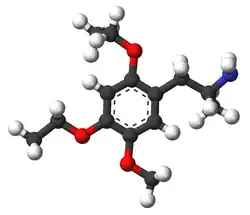EEM (psychedelic)
 | |
 | |
| Names | |
|---|---|
| Preferred IUPAC name
1-(2,4-Diethoxy-5-methoxyphenyl)propan-2-amine | |
| Identifiers | |
3D model (JSmol)
|
|
| ChemSpider | |
PubChem CID
|
|
| UNII | |
CompTox Dashboard (EPA)
|
|
| |
| |
| Properties | |
| C14H23NO3 | |
| Molar mass | 253.342 g·mol−1 |
Except where otherwise noted, data are given for materials in their standard state (at 25 °C [77 °F], 100 kPa).
Infobox references
| |
EEM (2,4-diethoxy-5-methoxyamphetamine) is a lesser-known substituted amphetamine. It is a diethoxy-methoxy analog of trimethoxyamphetamine (TMA-2). EEM was first synthesized by Alexander Shulgin. In his book PiHKAL, both the dosage and duration are unknown.[1] EEM produces few to no effects. Very little data exists about the pharmacological properties, metabolism, and toxicity of EEM.
See also
References